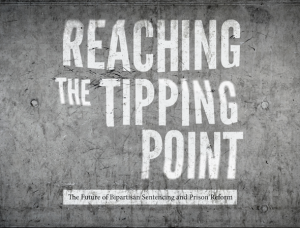Bipartisan panel: Criminal justice system is ‘Reaching the Tipping Point’

TIPPING OVER: Can the criminal justice system be reformed?
By Josh Kaib | Watchdog.org
WASHINGTON, D.C. — Legal experts from across the political spectrum came together Wednesday to find common ground on overcriminalization.
The Charles Koch Institute hosted “Reaching the Tipping Point,” an event which examined the future of bipartisan sentencing and prison reform. Co-sponsors included Families Against Mandatory Minimums, the American Civil Liberties Union, the Texas Public Policy Foundation, and the Heritage Foundation.
William Ruger, vice president for research and policy at the Charles Koch Institute, moderated a discussion between panelists and introduced the issue by telling the audience that “there are great consequences of just doing nothing.”
“This is an area in which we really need to have new ideas and new thoughts,” Ruger said.
Each panelist took five minutes to give their quick take on the issue, each emphasizing the area they felt most important.
Molly Gill of Families Against Mandatory Minimums made it clear. Her groups wants to eliminate mandatory minimum sentences. Though they were originally intended to put away drug kingpins, many others have been swept up by the laws. Gill suggested “cheaper, safer, smarter” crime policies.
The math is simple: Put people away for longer sentences, you end up with more people in jail. America has 2.3 million people in prison, the highest incarceration rate in the industrialized world.
“As a lawyer, I went to law school so I’d never have to do math,” Gill said. “But when you keep putting people in prison for a very long period of time time, guess what happens?”
Longer sentences also may help to explain recidivism rates — past offenders returning to prison contribute to the large prison population.
Gill added that, as a nation, Americans must be smarter about how limited resources are used. She called prison an antiquated system for dealing with issues like drug abuse. The savings from decreased incarcerations will allow more funding for more effective public safety spending.
Marc Levin of the Texas Public Policy Foundation and its Right on Crime initiative agreed with much of what Gill said. He pointed to improvements made in Texas, where both the crime rate and incarceration rate have fallen.
“People are coming together to do things that simply make sense from a public safety and a cost control perspective,” Levin said.
Levin added that many of the states making these reforms are conservative states.
He pointed to a number of solutions to overcriminalization, including rolling back the number of federal offenses, returning many of these criminal issues to the state level, and having a unified criminal code that clarifies our overly complicated federal laws.
John Malcolm, director of the Edwin Meese III Center at the Heritage Foundation, focused much of his remarks on the hundreds of thousands of regulatory laws that can trap people unknowingly.
Though he was the most conservative of the panelists, he made clear at the beginning that “We all agree that overcriminalization and overfederalization are a problem and at least some mens rea reform and sentencing reform is needed.”
Malcolm said that while they may not agree on every piece of legislation, they can also find agreement on other legislative fixes, even if for very different reasons.
He touched on the issue of overfederalization: More criminal laws are being taken over by the federal government, and this makes reform at the state level more difficult.
“Many of these laws are vague and over-broad,” Malcolm said.
He added that for others, it’s the opposite problem.
“There are criminal laws that are so hyper-technical that you either have to have a law degree or a degree in science to understand them.”
The final panelist, Laura Murphy of the ACLU’s Washington Legislative Office, discussed racial bias and the “War on Drugs.”
“The effect of the War on Drugs, in the African-American community in particular, has been tragic,” Murphy said. “There are more African-Americans now in the custody or under the supervision of the criminal justice system than there were enslaved African-Americans.”
And though the African-American community has been hit the hardest, she added that the Latino community is increasingly facing negative effects, as are low-income whites.
“We’ve got to come to grips with the failure of the War on Drugs,” Murphy said. “It’s basically been a War on Communities.”
During a question-and-answer session, panelists discussed the real-world effects that overcriminalization has on people, from the inability to get jobs after incarceration to people being thrown in prison due to the misdeeds of people close to them.
Some panelists called on getting rid of mandatory minimums, while John Malcolm suggested simply reducing them. The consensus was that doing nothing isn’t an option.
There is a chance for bipartisan reform at the state level and in Congress. Panelists pointed to The Smarter Sentencing Act and The Justice Safety Valve Act in the current Congress as two examples.
At the state level, Marc Levin said Governors like Nathan Deal, R-Ga, have made reform a priority and forced their legislatures to act.
Laura Murphy said state-level movement on this issue is creating the environment for Congress to take it on.
In gridlocked Washington, is it still possible for people from all sides to come together to solve a problem? If Wednesday’s discussion is any indication, there is still hope.







